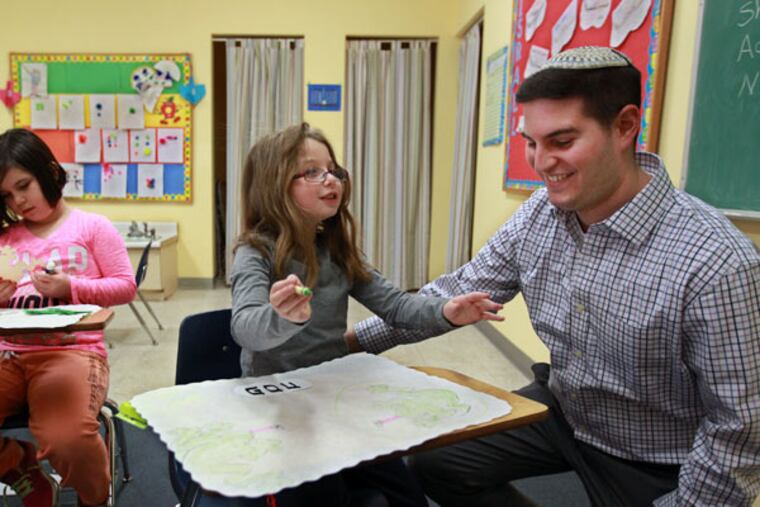After disillusionment, finding his way back to Judaism
As a boy growing up in Cherry Hill, Michael Perice was in awe of his rabbi, Fred Neulander. "I remember him standing up there in front of hundreds of people," says Perice, now a rabbinical student. "He was a master orator. He was magnetic."

As a boy growing up in Cherry Hill, Michael Perice was in awe of his rabbi, Fred Neulander.
"I remember him standing up there in front of hundreds of people," says Perice, now a rabbinical student. "He was a master orator. He was magnetic."
But the boy felt betrayed when the rabbi he expected would someday officiate at his bar mitzvah was charged - and ultimately, convicted - in the lurid murder-for-hire of his wife, Carol.
Perice lost faith in Neulander ("a sociopath") and in rabbis generally ("I thought they were phonies"). Then he lost faith itself.
"I didn't want anything to do with" Judaism, says Perice, 29, who was 8 at the time of the murder and 16 when Neulander's second sensational trial ended in a murder conviction.
By then he had stopped regularly attending services with his family at Congregation M'kor Shalom.
"Neulander took my childhood Jewish experience away from me," Perice says, a hint of anger ruffling his earnest, upbeat demeanor. "I really believe that."
Neulander, 73, is serving a life sentence in state prison in Trenton, where he has a Facebook page proclaiming his innocence.
Happily, Perice, who now lives in Philadelphia, has re-embraced Judaism. But it took "lots of soul-searching" and time.
After graduating from Cherry Hill East in 2004, Perice earned a bachelor's degree in political science from Temple University, worked on political campaigns, and considered going to law school.
"But I knew that no matter what I did or achieved, it wouldn't be enough," he says. "I was missing something. I felt like an incomplete person."
Working for his family's funeral business in his mid-20s got him reacquainted with rabbis and their pastoral work. Sharing a prayer with an elderly mourner at a graveside service in 2012 proved to be pivotal.
"Through Judaism, I was helping this woman, and it was so powerful," Perice recalls. "I began thinking, Could I be a rabbi?"
The egalitarian philosophy of Reconstructionist Judaism "played a huge part" in his decision. "I wanted to be part of a community of diversity and equality," he says.
'New generation'
Perice is in his second year at Reconstructionist Rabbinical College in Wyncote and midway through a 12-month internship at Congregation Beth Tikvah in Marlton, a progressive Conservative synagogue.
Intense, eloquent, and personable, he's helping administer the school program on Sundays. As we visit classrooms, it's clear that he's jazzed by interacting with the students, who number about 30 and range in age from 4 to 16.
"Michael's a good guy. . . . He will represent the new generation of rabbis," says Rabbi Gary Gans, who has led Beth Tikvah since 1981.
Perice, Gans adds, is one of many young Jews "who see traditional life as valuable. That searching, that sense of 'Let's look, together' is part of what he will excel in."
"I always used to tell him, 'You should be a rabbi,' " says Perice's mother, Eileen Norman Perice. She lives in Berlin Township and is the vice president of the funeral-home firm Goldstein's Rosenberg's Raphael Sacks.
'A revelation'
"Michael always wanted to help people," Eileen Perice, 57, tells me. "And ever since he started this journey, he just has a fire and a drive we've all been waiting for. . . . I think he'll make an amazing rabbi."
First, says the future rabbi, "there's a wealth of information to be learned."
Including Hebrew, which he studied as a boy and is slowly remastering. "It's the most amazing feeling to have the [language] of your ancestors on the tip of your tongue," he says. "To be able to speak it, to be able to understand it, is a revelation. It's a beautiful thing."
While what he calls "the Neulander stuff" drove him away from Judaism for a decade, Perice also says the experience taught him an essential lesson.
"Trust is paramount in the relationship" between rabbis and their congregations, he says.
"If you lose that trust, you can never get it back. I hold on to that philosophy every time I enter the shul."
Eileen Perice is onto something. Her son has the makings of a fine rabbi.